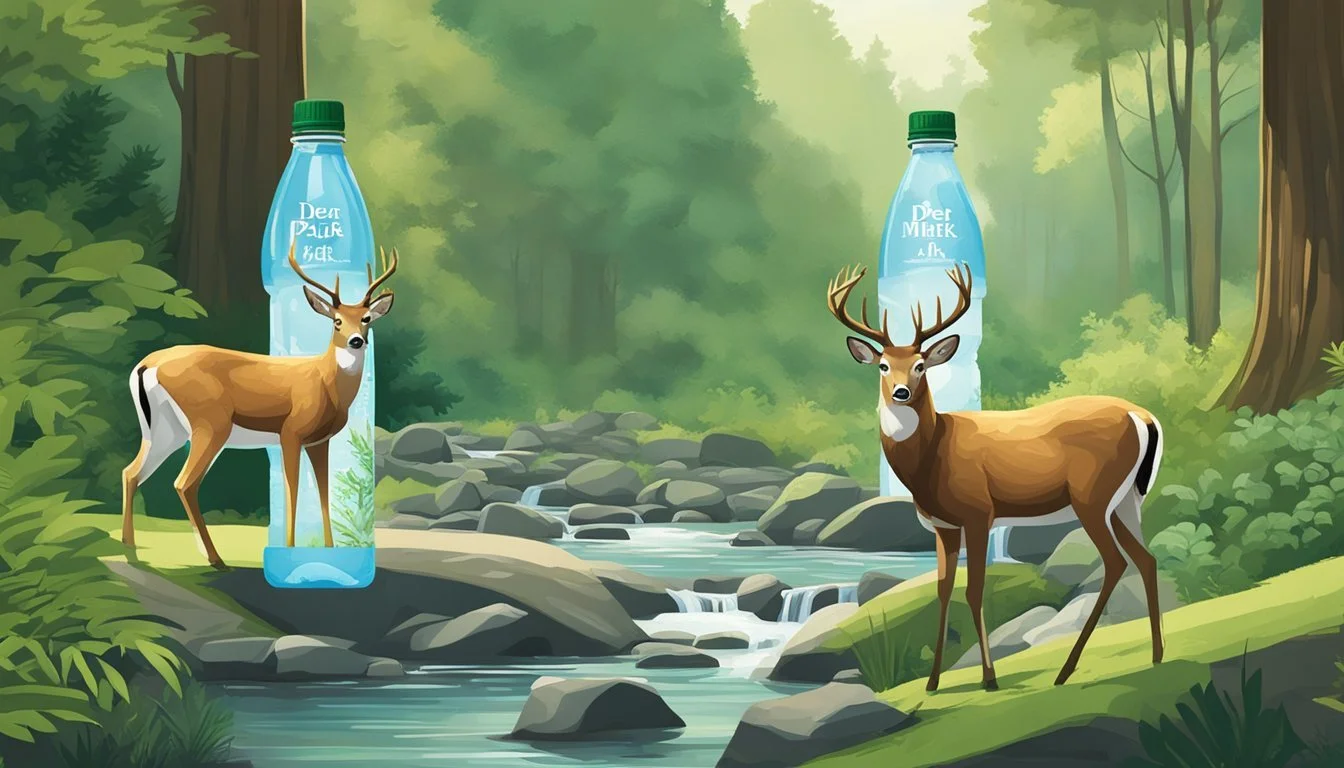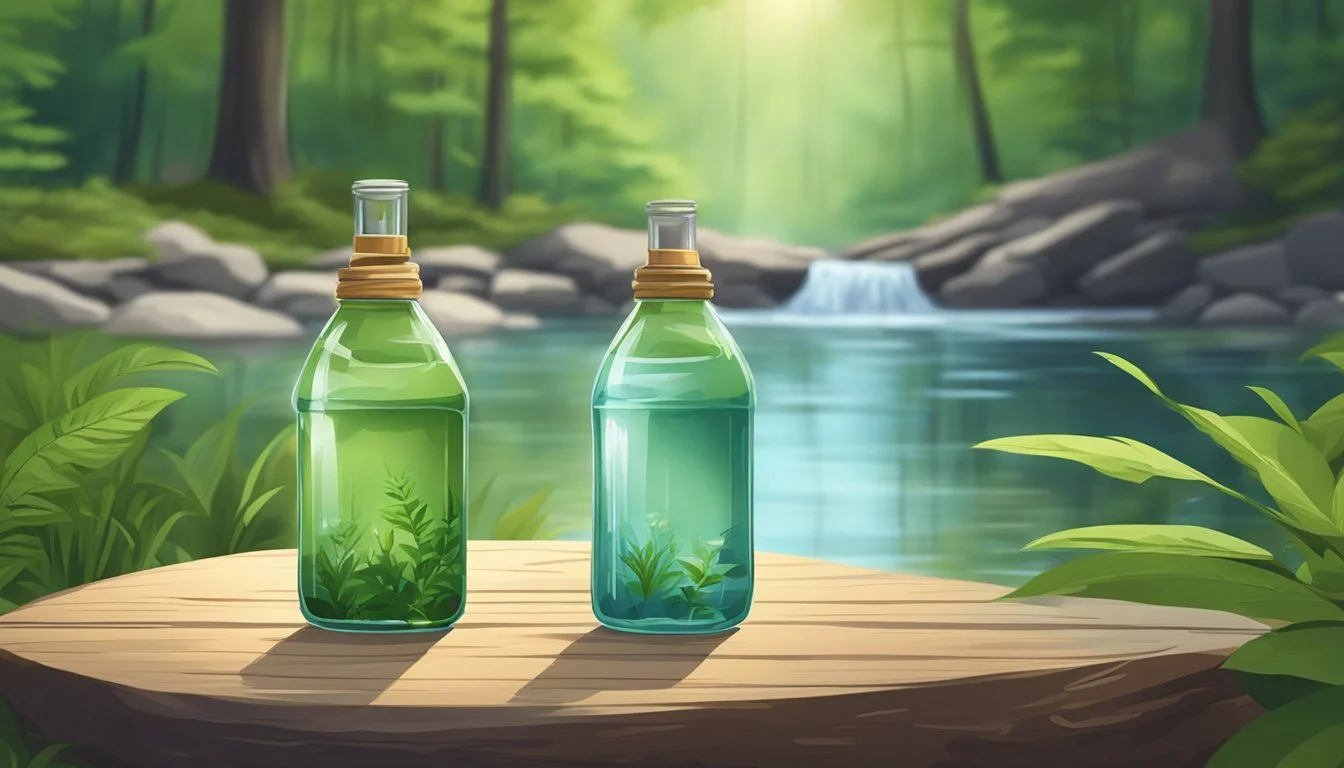Deer Park vs. Whole Foods Italian Still Mineral Water
Which Bottled Water is Better?
Choosing the right bottled water can be a daunting task for consumers given the myriad of options available on the market. Today, we'll be taking a closer look at two popular brands: Deer Park and Whole Foods Italian Still Mineral Water. While each water offers its unique characteristics, it's essential to identify which one stands out regarding taste, quality, and value.
Deer Park, sourced from multiple springs across the eastern United States, is known for its crisp and refreshing taste. This 100% natural spring water has built a reputation over the years for its purity and reliability, making it a favorite among many consumers. On the other hand, Whole Foods Italian Still Mineral Water distinguishes itself by being sourced from the pristine springs of Italy, promising a smooth and balanced flavor profile that appeals to those seeking a refined drinking experience.
Comparing these two brands involves examining their source, taste, and overall consumer satisfaction. Whether you prefer the crispness of Deer Park or the rich mineral content of Whole Foods Italian Still Mineral Water, understanding their differences helps you make an informed choice.
Understanding Bottled Water
Bottled water comes in various types, each with unique sources, regulations, and environmental implications. This section delves into these categories, examines safety regulations, and explores the environmental impact of bottled water.
Categories of Bottled Water
Bottled water is not all the same and can be categorized into several types. Spring water and mineral water are sourced from natural springs and contain varying levels of minerals. Other categories include purified water, which undergoes processing like distillation or reverse osmosis to remove impurities, and artesian water, derived from a confined aquifer.
Brands such as Deer Park and Whole Foods Italian Mineral Water highlight their unique sources and mineral content. Spring water brands often market the natural taste due to their mineral composition, while purified water brands focus on the processed purity.
Regulations and Safety
The safety and quality of bottled water are overseen by various regulatory bodies. In the United States, the FDA (Food and Drug Administration) regulates bottled water under the Federal Food, Drug, and Cosmetic Act. The EPA (Environmental Protection Agency) handles tap water standards, and these agencies work together to ensure safety.
Bottled water brands must adhere to these strict regulations, including labeling, source verification, and processing methods. International guidelines are often set by the International Bottled Water Association (IBWA), which ensures that global standards are met for bottled water products.
Environmental Impact of Bottled Water
The environmental footprint of bottled water is a critical concern. Plastic packaging contributes significantly to pollution, with millions of bottles ending up in landfills and oceans each year. Efforts to improve sustainability include using recyclable materials and promoting reusable bottles.
Brands are increasingly focusing on reducing their carbon footprint through eco-friendly practices and environmentally conscious sourcing methods. Evaluating the lifecycle of bottled water, from sourcing to packaging to transportation, reveals the substantial impacts and underscores the need for sustainable practices in the hydration industry.
Comparing Deer Park and Whole Foods Brands
This section examines the key aspects that distinguish Deer Park and Whole Foods Italian Still Mineral Water, providing a clear breakdown of factors such as company background, water source, taste profile, mineral content, and purity levels.
Company Background
Deer Park is a brand owned by Nestlé, established in 1873. It sources its water from springs across the Eastern Seaboard of the United States.
Whole Foods' Italian Still Mineral Water originates from the Umbria region of Italy. Whole Foods Market emphasizes organic and natural products, reflecting in their bottled water offering.
Source and Origin
Deer Park sources its water from multiple natural springs along the Eastern Seaboard, ensuring a diverse and balanced mineral composition. The springs are located in protected environments.
Whole Foods' Italian Still Mineral Water is sourced from springs in Umbria, Italy, known for their mineral-rich waters naturally filtered through volcanic rock, a unique distinction from Deer Park’s multiple sources.
Taste Profile
Deer Park water is often described as having a crisp and clean taste, derived from its natural spring sources. It is prized for its refreshing quality.
Whole Foods’ Italian Still Mineral Water has a distinct taste, described as smooth and slightly sweet, attributed to its unique mineral content. The volcanic filtering process contributes to this unique flavor profile.
Mineral Content Analysis
Deer Park offers water with a balanced mineral content, primarily composed of calcium, magnesium, and potassium. This results in a refreshing taste that appeals to many consumers.
Whole Foods' Italian Still Mineral Water boasts a significantly higher mineral content due to its volcanic origin. It contains higher levels of calcium and magnesium, giving it its characteristic richness.
Purity and Contaminant Levels
Deer Park takes pride in its rigorous purification processes, ensuring the water is free of harmful contaminants. The brand emphasizes its natural purity.
Whole Foods markets its Italian Still Mineral Water as free from synthetic additives, maintaining natural purity. Independent tests have found low levels of contaminants, consistent with the volcanic source’s filtration benefits.
Health Considerations
Deer Park and Whole Foods Italian Still Mineral Water both have unique qualities that impact health, from hydration and electrolyte content to potential risks from contaminants like heavy metals.
Hydration and Electrolytes
Proper hydration is crucial for maintaining health, as water is vital for bodily functions. Deer Park is a natural spring water sourced from various locations in the United States, known for its clean, refreshing taste. It provides essential hydration but contains lower levels of electrolytes.
Whole Foods Italian Still Mineral Water, sourced from Italian springs, typically has higher mineral content. It includes electrolytes such as calcium, magnesium, and potassium, which can aid muscle function and hydration. Both waters hydrate well, but the mineral content in Whole Foods Italian Still Mineral Water offers additional benefits.
Health Benefits vs. Risks
When considering health benefits and risks, it is essential to evaluate potential contaminants. Deer Park has not been flagged for significant health risks recently. On the other hand, Consumer Reports identified higher levels of arsenic in some Whole Foods bottled water samples, nearing or exceeding federal safety limits.
Exposure to heavy metals like lead, arsenic, and mercury poses significant health risks, including cardiovascular issues, cancer, and developmental problems. Therefore, consumers must ensure their water sources are tested and safe. Though both brands offer hydration and essential minerals, understanding potential risks is critical for informed choices.
Consumer Information
The following sections explore how Deer Park and Whole Foods Italian Still Mineral Water present themselves to consumers, including their labeling practices, marketing strategies, pricing, and accessibility.
Labeling and Marketing
Deer Park focuses on its natural spring water origins. The labeling emphasizes that the water comes from carefully selected springs in the United States. Their branding projects a connection to nature and purity, using green and blue color schemes that evoke images of forests and fresh water sources.
Whole Foods Italian Still Mineral Water highlights its European origins, specifically from sources in Italy. The labeling is minimalist and elegant, often using white and gold tones. This aims to project a sense of premium quality and sophisticated taste, suitable for discerning customers seeking a touch of luxury in their hydration choices.
Both brands ensure transparency by listing essential information such as the source, mineral content, and bottling date on the label. They aim to build customer trust through clarity and a strong brand story. Whether it’s the natural American springs or the Italian mineral sources, each brand leverages its unique selling point to attract consumers.
Pricing and Accessibility
Deer Park is generally more affordable and widely available across various retailers, including supermarkets and convenience stores. The prices for Deer Park water range based on the packaging and volume, but it is marketed as an everyday water choice for a broad audience.
Whole Foods Italian Still Mineral Water is positioned as a premium product with a higher price point. Availability is more limited, primarily found in Whole Foods Market locations and selected upscale grocery stores. The cost reflects its branding as a high-quality, imported product.
Consumers looking for readily available and budget-friendly options might gravitate towards Deer Park. Those seeking high-end, imported water and willing to pay a bit more would likely choose Whole Foods' offering. Pricing strategies and distribution channels effectively target distinct market segments for each brand.
Expert Opinions and Testing
This section provides a detailed look into the expert opinions and independent lab tests that compare Deer Park and Whole Foods Italian Still Mineral Water, with a focus on taste, safety, and certifications.
Taste Testing and Reviews
Taste testing conducted by various experts and consumers has provided valuable insights into both brands. Deer Park is often praised for its crisp and clean taste, which many find refreshing and ideal for daily consumption.
Whole Foods Italian Still Mineral Water, on the other hand, is noted for its mineral-rich profile, which lends a slightly smoother and richer taste.
Reviewers generally appreciate this unique profile, stating that it enhances the overall drinking experience. Both waters have their dedicated fan bases depending on personal preference for taste.
Independent Lab Testing
Independent lab testing is critical in ensuring the safety and quality of bottled water. Consumer Reports and other laboratories have conducted extensive tests on Deer Park and Whole Foods Italian Still Mineral Water.
Deer Park has been found to be free from harmful contaminants and meets all safety standards set by federal regulations.
Tests on Whole Foods Italian Still Mineral Water revealed some concerns, including levels of arsenic close to the federal limit. Despite these findings, it still falls within the acceptable range but warrants attention from consumers.
Certifications and Endorsements
Certifications and endorsements play a vital role in establishing the credibility of bottled water brands. Deer Park boasts several certifications, including recognition from the Environmental Protection Agency (EPA) for meeting stringent purity standards.
Whole Foods Italian Still Mineral Water is certified by the Natural Products Association (NPA) and carries endorsements from several health experts.
These certifications ensure that both brands adhere to high standards of quality and safety, providing consumers with confidence in their choices.
Alternatives to Bottled Water
When considering alternatives to bottled water, two main options emerge: tap water with filtration systems and sparkling and flavored water brands. Each option provides a unique way to enjoy hydration without relying on traditional bottled water.
Tap Water and Filtration Systems
Tap water is a readily available alternative that can be made safe and enjoyable with the use of filtration systems. Filtration options range from simple pitcher filters to more advanced under-sink systems. Brands like Brita and PUR offer accessible solutions that reduce contaminants such as chlorine, lead, and sediment.
Municipal tap water in many regions is subject to regulations that ensure it is safe to drink. However, a good filtration system can enhance taste and odor, making it a more appealing option for daily hydration. Additionally, using tap water and filters is a cost-effective approach, eliminating the need for single-use plastic bottles and reducing environmental impact.
Sparkling and Flavored Water Brands
For those who enjoy a fizzy sensation, sparkling and flavored water brands provide an excellent alternative. Popular brands include Bubly, La Croix, Topo Chico, and Perrier. Each offers a variety of flavors and carbonation levels to suit different preferences.
Sparkling water can be a refreshing choice and often contains no calories, making it a healthier option compared to sugary sodas. Many brands use natural flavors, providing a clean and crisp taste without artificial additives.
Considering these alternatives helps reduce plastic waste and provides diverse options to cater to different tastes and preferences, all while maintaining hydration.
The Bottom Line
When deciding between Deer Park and Whole Foods Italian Still Mineral Water, consumers should consider several factors such as health, safety, convenience, and sustainability.
Health and Safety: Deer Park's Natural Spring Water has been found to contain PFAS at 1.21 ppt, which is below the IBWA's safety threshold of 10 ppt for total PFAS. Whole Foods' 365 Spring Water also meets safety standards, but specific PFAS data is less available.
Consumer Choice: Taste and personal preference play significant roles. Deer Park offers a crisp and clean taste, while Whole Foods' Italian Still Mineral Water is appreciated for its smooth texture and slight mineral flavor.
Convenience: Both brands are widely available. Deer Park can be found in numerous grocery stores across the U.S., and Whole Foods 365 is easily accessible at Whole Foods Market locations.
Sustainability: Consumers mindful of environmental impact may consider the packaging. Deer Park has made strides in using recycled plastic, while Whole Foods emphasizes sustainability in its product sourcing.
Price: Whole Foods’ Italian Still Mineral Water tends to be more premium in price compared to Deer Park, but price may vary regionally and by retailer.
In Summary: The choice between Deer Park and Whole Foods Italian Still Mineral Water depends on what factors – health, safety, taste, convenience, or sustainability – are most important to the individual consumer. Both options have their merits and can cater to different preferences and priorities.
More About Deer Park
Deer Park vs Cascade Mountain: Which Bottled Water is Better?
Deer Park vs Hawaii Volcanic: Which Bottled Water is Better?
Deer Park vs Hawaiian Springs: Which Bottled Water is Better?
Deer Park vs Icelandic Glacial: Which Bottled Water is Better?
Deer Park vs Kirkland Signature: Which Bottled Water is Better?
Deer Park vs Mountain Valley Spring Water: Which Bottled Water is Better?
Deer Park vs Nestle Pure Life: Which Bottled Water is Better?
Deer Park vs Richard's Rainwater: Which Bottled Water is Better?
Deer Park vs Solan de Cabras: Which Bottled Water is Better?
Deer Park vs Talking Rain AQA: Which Bottled Water is Better?
Deer Park vs Whole Foods 365: Which Bottled Water is Better?
More About Whole Foods Italian Still Mineral Water
Whole Foods Italian Still Mineral water vs HFactor: Which Bottled Water is Better?
Acqua Pana vs Whole Foods Italian Still Mineral water: Which Bottled Water is Better?
Antipodes vs Whole Foods Italian Still Mineral water: Which Bottled Water is Better?
Aqua Carpatica vs Whole Foods Italian Still Mineral water: Which Bottled Water is Better?
Aquafina vs Whole Foods Italian Still Mineral water: Which Bottled Water is Better?
Arrowhead vs Whole Foods Italian Still Mineral water: Which Bottled Water is Better?
Bai vs Whole Foods Italian Still Mineral water: Which Bottled Water is Better?
Boxed Water vs Whole Foods Italian Still Mineral water: Which Bottled Water is Better?
Castle Rock vs Whole Foods Italian Still Mineral water: Which Bottled Water is Better?
Core Hydration vs Whole Foods Italian Still Mineral water: Which Bottled Water is Better?
Erewhon vs Whole Foods Italian Still Mineral water: Which Bottled Water is Better?
Essentia vs Whole Foods Italian Still Mineral water: Which Bottled Water is Better?
Eternal vs Whole Foods Italian Still Mineral water: Which Bottled Water is Better?
Ethos vs Whole Foods Italian Still Mineral water: Which Bottled Water is Better?
Evian vs Whole Foods Italian Still Mineral water: Which Bottled Water is Better?
Fiji vs Whole Foods Italian Still Mineral water: Which Bottled Water is Better?
Flow vs Whole Foods Italian Still Mineral water: Which Bottled Water is Better?
Hawaii Volcanic vs Whole Foods Italian Still Mineral water: Which Bottled Water is Better?
Hawaiian Springs vs Whole Foods Italian Still Mineral water: Which Bottled Water is Better?
Ice Mountain vs Whole Foods Italian Still Mineral water: Which Bottled Water is Better?
Icelandic Glacial vs Whole Foods Italian Still Mineral water: Which Bottled Water is Better?
Just Water vs Whole Foods Italian Still Mineral water: Which Bottled Water is Better?
LIFEWTR vs Whole Foods Italian Still Mineral water: Which Bottled Water is Better?
Liquid Death vs Whole Foods Italian Still Mineral water: Which Bottled Water is Better?
Mananalu vs Whole Foods Italian Still Mineral water: Which Bottled Water is Better?
Nestle Pure Life vs Whole Foods Italian Still Mineral water: Which Bottled Water is Better?
Origin vs Whole Foods Italian Still Mineral water: Which Bottled Water is Better?
Ozarka vs Whole Foods Italian Still Mineral water: Which Bottled Water is Better?
Path vs Whole Foods Italian Still Mineral water: Which Bottled Water is Better?
Penta vs Whole Foods Italian Still Mineral water: Which Bottled Water is Better?
Perrier vs Whole Foods Italian Still Mineral water: Which Bottled Water is Better?
Poland Spring vs Whole Foods Italian Still Mineral water: Which Bottled Water is Better?
Purely Sedona vs Whole Foods Italian Still Mineral water: Which Bottled Water is Better?
San Pellegrino vs Whole Foods Italian Still Mineral water: Which Bottled Water is Better?
Smartwater vs Whole Foods Italian Still Mineral water: Which Bottled Water is Better?
Solan de Cabras vs Whole Foods Italian Still Mineral water: Which Bottled Water is Better?
Starkey vs Whole Foods Italian Still Mineral water: Which Bottled Water is Better?
Tahoe vs Whole Foods Italian Still Mineral water: Which Bottled Water is Better?
Topo Chico vs Whole Foods Italian Still Mineral water: Which Bottled Water is Better?
Tru Alka vs Whole Foods Italian Still Mineral water: Which Bottled Water is Better?
Volvic vs Whole Foods Italian Still Mineral water: Which Bottled Water is Better?
Voss vs Whole Foods Italian Still Mineral water: Which Bottled Water is Better?
Waiakea vs Whole Foods Italian Still Mineral water: Which Bottled Water is Better?
Whole Foods Italian Still Mineral water vs 1907water: Which Bottled Water is Better?
Whole Foods Italian Still Mineral water vs 7-Select: Which Bottled Water is Better?
Whole Foods Italian Still Mineral water vs Action: Which Bottled Water is Better?
Whole Foods Italian Still Mineral water vs Alkaline88: Which Bottled Water is Better?
Whole Foods Italian Still Mineral water vs Augi: Which Bottled Water is Better?
Whole Foods Italian Still Mineral water vs Big Chill: Which Bottled Water is Better?
Whole Foods Italian Still Mineral water vs Big Win: Which Bottled Water is Better?
Whole Foods Italian Still Mineral water vs Blk: Which Bottled Water is Better?
Whole Foods Italian Still Mineral water vs BodyArmor: Which Bottled Water is Better?
Whole Foods Italian Still Mineral water vs Cascade Mountain: Which Bottled Water is Better?
Whole Foods Italian Still Mineral water vs CBD Living: Which Bottled Water is Better?
Whole Foods Italian Still Mineral water vs Cirro: Which Bottled Water is Better?
Whole Foods Italian Still Mineral water vs Crystal Geyser: Which Bottled Water is Better?
Whole Foods Italian Still Mineral water vs Crystal Lake: Which Bottled Water is Better?
Whole Foods Italian Still Mineral water vs Dasani: Which Bottled Water is Better?
Whole Foods Italian Still Mineral water vs Defy: Which Bottled Water is Better?
Whole Foods Italian Still Mineral water vs Essence pH10: Which Bottled Water is Better?
Whole Foods Italian Still Mineral water vs Kirkland Signature: Which Bottled Water is Better?
Whole Foods Italian Still Mineral water vs Kroger: Which Bottled Water is Better?
Whole Foods Italian Still Mineral water vs Open Water: Which Bottled Water is Better?
Whole Foods Italian Still Mineral water vs Ophora: Which Bottled Water is Better?
Whole Foods Italian Still Mineral water vs Proud Source: Which Bottled Water is Better?
Whole Foods Italian Still Mineral water vs Pure Life: Which Bottled Water is Better?
Whole Foods Italian Still Mineral water vs Ramona: Which Bottled Water is Better?
Whole Foods Italian Still Mineral water vs Refreshe: Which Bottled Water is Better?
Whole Foods Italian Still Mineral water vs Richard's Rainwater: Which Bottled Water is Better?
Whole Foods Italian Still Mineral water vs Simple Truth: Which Bottled Water is Better?
Whole Foods Italian Still Mineral water vs Skyra: Which Bottled Water is Better?
Whole Foods Italian Still Mineral water vs Talking Rain AQA: Which Bottled Water is Better?
Whole Foods Italian Still Mineral water vs The Well: Which Bottled Water is Better?
Whole Foods Italian Still Mineral water vs Weird Water: Which Bottled Water is Better?
Whole Foods Italian Still Mineral water vs Whole Foods 365: Which Bottled Water is Better?
Whole Foods Italian Still Mineral water vs Zenwtr: Which Bottled Water is Better?
Zephyrhills vs Whole Foods Italian Still Mineral water: Which Bottled Water is Better?






